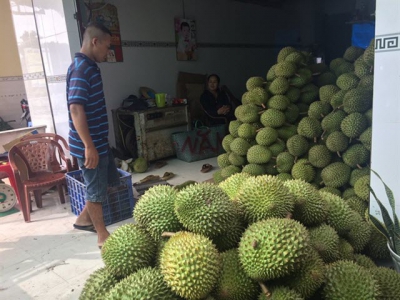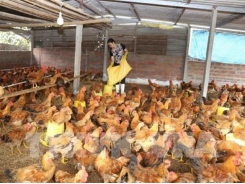Durian prices in HCM City remain high despite oversupply

The price of durian in the Mekong Delta is declining as traders have stopped buying the fruit to export to China in light of its stricter control on agricultural imports. — VNS Photo
Ho Chi Minh City – For the last few days, the price of off-season durian in the Mekong (Cửu Long) Delta has declined sharply as traders have stopped purchasing the fruit to export to the Chinese market, according to reports in local newspapers.
The price of type 1 (best quality) durian on Thanh Bình Islet in Vĩnh Long Province’s Vũng Liêm District, for example, fell by nearly half to VNĐ40,000 (US$1.7). Ripe durians are stacked up at growers’ houses, but few traders are coming to make purchases.
Lê Văn Hưu, owner of a durian garden in the district, told Người lao động (The Labourer) newspaper that he has more than 15 tonnes of the fruit that needs to be harvested soon.
“If I sell the fruit at the price of VNĐ30,000-40,000 per kilogramme, I will suffer losses for sure because off-season durian needs more care,” he said. “I can’t sell much at retail prices (directly to consumers) because it can’t be preserved for long and can easily go bad quickly.”
To cope with the oversupply crisis, several durian growers are selling the fruit online or along streets.
Tâm in Long An Province told online news site Vnexpress.net that he had sold the fruit for VNĐ10,000-35,000 per kilogramme at his garden.
The lowest price is for type-3 durian, which is small and does not have a good-looking shape.
Tâm said that many traders had visited his garden to check out the fruit before the harvest season, but only a few have stopped by recently, and they have bought only a small quantity.
The traders explained that they were only serving domestic consumers and were not exporting the fruit as they had done before.
Vnexpress.net quoted a director of a fruit export-import company in Tiền Giang as saying that the price of off-season durian fell because China had stopped the import of Vietnamese durian at border gates. This caused many traders to stop purchasing the fruit as well.
The company’s executive said the firm in recent years had exported 30-40 containers of 18 tonnes each of durian per month to China.
But this year the company sent only one shipment to China, and now has to wait until export of the fruit resumes.
TVC, a director of a company which exports fruit to China, said his company had not bought a large amount since fruit exports to China were not accepted through official channels.
“My business colleagues who usually export to China via unofficial channels are now suffering big losses as they cannot sell the fruit like before,” he said. “In addition, fresh goods lose their value very fast, and they’ve already paid money to farmers.”
TVC said that government agencies should work out a way for firms to export to China via official channels and inform farmers about market information so they can choose what to produce.
Despite the oversupply in the delta, consumers in HCM City are still paying high prices for durian at wet markets and supermarkets.
Thanh Niên (Young People) newspaper reported that durian was being sold at VNĐ90,000-120,000 per kilogramme at fruit shops on Nguyễn Tri Phương Street in District 10 and at An Đông Market in District 5.
At Co.op Mart supermarket, the price was VNĐ80,000 per kilogramme, while at Lotte Mart it was VNĐ89,000 per kilogramme.
Sellers said the prices were high because the fruit was off-season and its quality was guaranteed. Transport and delivery fees have also added to the price.
Dr Bùi Chí Bửu, former director of the Institute of Agricultural Sciences for Southern Việt Nam, said the agricultural sector must restructure its production and distribution to solve the problem of farmers struggling to sell products while consumers have to pay high prices for farm produce.
He said farmers should work together in co-operatives and apply safe farm produce standards so they can easily find markets and sell products in large quantities to distributors.
Nguyễn Đình Tùng, general director of Vina T&T Import Export Service Trading Co Ltd (Vina T&T Group), said producers should pay closer attention to market information, especially the Chinese market on which many agricultural exporters heavily rely.
To help vary their markets, he said farmers should produce quality products first.
In the first half of the year, China was the largest export market of Vietnamese vegetables and fruit, consuming 74 per cent of the total national vegetable and fruit exports.
However, China has now tightened its control of agricultural imports, which means Việt Nam’s agricultural and aquatic exports to the country will face higher quality requirements and strict rules on product traceability and labeling.
Có thể bạn quan tâm
Phần mềm

Phối trộn thức ăn chăn nuôi

Pha dung dịch thủy canh

Định mức cho tôm ăn

Phối trộn phân bón NPK

Xác định tỷ lệ tôm sống

Chuyển đổi đơn vị phân bón

Xác định công suất sục khí

Chuyển đổi đơn vị tôm

Tính diện tích nhà kính

Tính thể tích ao hồ




 Vietnam spends 1.57 billion USD on fruit, vegetables…
Vietnam spends 1.57 billion USD on fruit, vegetables…  VBF 2018: Investment opportunities in smart agriculture
VBF 2018: Investment opportunities in smart agriculture